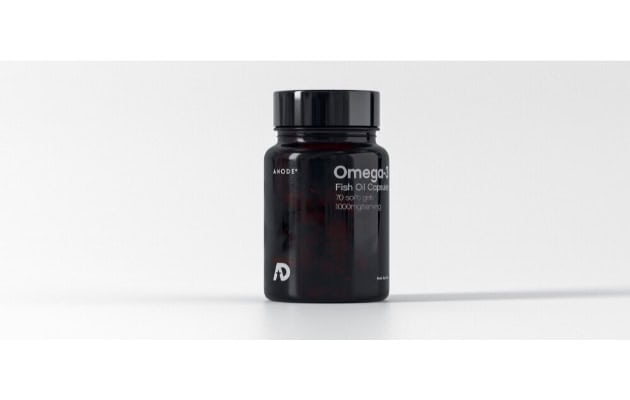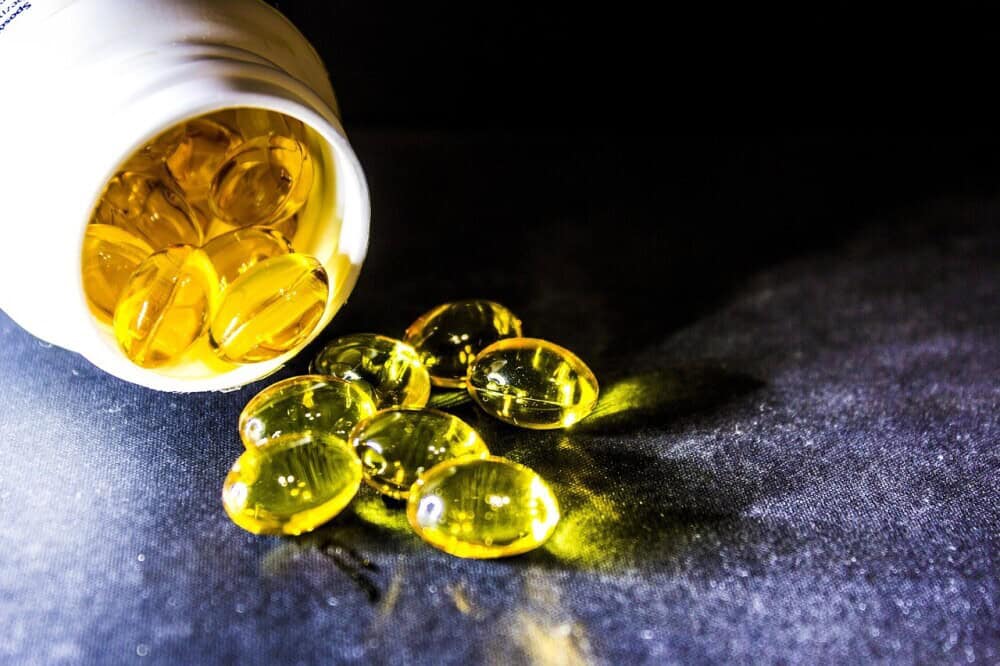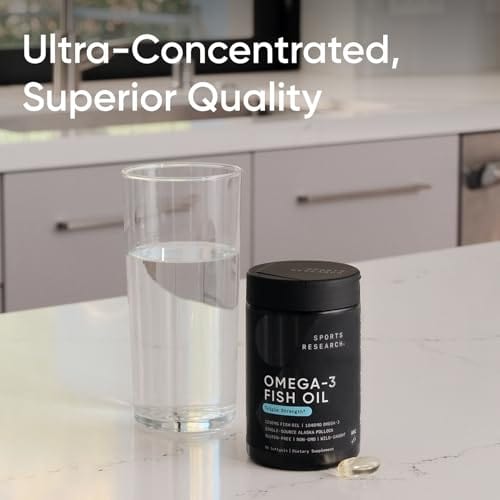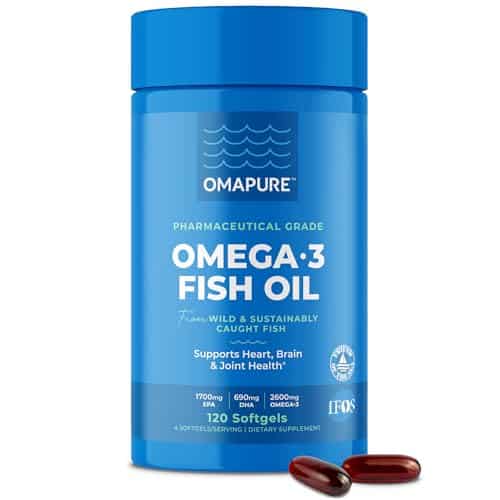How to Maximize Omega-3 Absorption
Fish oil has gained popularity as a must-have supplement for overall wellness. Packed with omega-3 fatty acids, including EPA and DHA, it supports crucial health areas like heart function, brain development, and joint flexibility. Whether you’re looking to reduce triglycerides, maintain cognitive sharpness, or ease inflammation, fish oil benefits offer time-tested solutions. While foods like salmon and mackerel provide natural sources of omega-3s, supplements remain a convenient way to meet daily requirements. Ready to unlock the potential of fish oil for your health? Keep reading to learn more.

To get the most out of your omega-3 supplement, keep the following tips in mind:
- Take It With Meals Containing Healthy Fats: Omega-3s are fat-soluble, meaning they absorb better when consumed with fat. Pair your supplement with meals that include foods like avocado, nuts, seeds, or olive oil.
- Be Consistent: Regular intake is key to reaping the long-term benefits. Choose a schedule that works for you, such as taking it with breakfast or dinner daily.
- Store Supplements Properly: Omega-3s are light, heat, and air sensitive. Keep your bottle in a cool, dark place to maintain freshness and prevent oxidation, which can reduce effectiveness.
- Avoid Taking It on an Empty Stomach: Absorption might be less effective without fats or food and could lead to mild digestive discomfort.
Some links on this page are affiliate links. If you click and make a purchase, I may earn a small commission at no extra cost to you. I only recommend products I trust and personally use.
Thanks for supporting my site and content!
Who Should Avoid Omega-3 Supplements?
While omega-3 supplements like fish oil are generally safe, some individuals should proceed with caution or consult a healthcare provider, such as:
- People on Blood-Thinning Medications: Omega-3s can thin blood, increasing the risk of bleeding when combined with anticoagulant medications (e.g., Warfarin or aspirin).
- Individuals with Fish or Shellfish Allergies: Always check product labels carefully and consider allergen-free alternatives if you have known sensitivities.
- Pregnant or Breastfeeding Women: While omega-3s are important during pregnancy, high doses can pose risks. Stick to supplements specifically formulated for maternal health.
- People Facing Surgery: Stop omega-3 supplementation two weeks before surgery to minimize bleeding risks during the procedure.
- Those Experiencing Side Effects: Common issues like fishy burps, nausea, or upset stomach may indicate a need for smaller doses or switching to a high-quality product free from impurities.
What Makes Krill Oil Unique Compared to Fish Oil?
For readers deciding between standard fish oil and krill oil, here’s a quick comparison:
| Feature | Fish Oil | Krill Oil |
|---|---|---|
| Omega-3 Content | High EPA/DHA levels | Lower EPA/DHA but better absorption (phospholipids) |
| Antioxidants | Minimal | Contains astaxanthin for added benefits |
| Taste | May cause fishy burps | Less likely to cause a fishy aftertaste |
| Sustainability | Overfishing concerns for certain species | Sourced from tiny crustaceans, more eco-friendly |
| Cost | Typically more affordable | Generally more expensive |
Pro Tip: Choosing a product like Qunol Advanced Omega-3 combines both benefits, offering superior absorption and added nutrients like choline and antioxidants.
Simple Ways to Add Omega-3s Through Diet
While supplements are a convenient option, you can also incorporate natural sources of omega-3s into your meals:
- Fatty Fish: Salmon, mackerel, sardines, and tuna are rich in EPA and DHA. Aim for 2 servings per week.
- Example Meal: Grilled salmon with a side of quinoa and roasted asparagus.
- Chia Seeds: High in ALA (an omega-3 precursor), they’re perfect for smoothies or oatmeal.
- Example: Add a tablespoon of chia seeds to your morning yogurt.
- Walnuts: A great source of plant-based omega-3s, perfect for snacking or topping salads.
- Example: Toss walnuts into a spinach and blueberry salad.
- Flax Seeds: Available as oil or ground seeds. Mix them into baked goods or salad dressings.
- Example: Blend flaxseed oil into your vinaigrette for extra nutrients.
- Edamame: A plant-based source of omega-3s, ideal for vegetarians.
- Example: Enjoy steamed edamame as a snack or mix into stir-fries.
Debunking Myths About Omega-3
Myth 1: Fish Oil is Only for Heart Health
Fact: While omega-3s are excellent for reducing heart disease risk, they also support brain health, eye function, and joint relief.
Myth 2: All Omega-3 Supplements Are the Same
Fact: Quality matters. Go for third-party-tested products with concentrated EPA/DHA levels to avoid impurities like mercury.
Myth 3: You Can Get Enough Omega-3s From Diet Alone
Fact: It’s possible but challenging for many people. Supplements fill the gap if you don’t consume enough fatty fish weekly.
FAQ: Fish Oil and Omega-3 Benefits
2. Who should avoid or consult a doctor before using omega-3 supplements?
- People on blood-thinning medications: Omega-3s can thin blood, increasing the risk of bleeding when combined with anticoagulants like Warfarin or aspirin.
- Individuals with fish or shellfish allergies: Choose allergen-free alternatives if needed and read labels carefully.
- Pregnant or breastfeeding women: Fish oil offers important benefits for fetal brain development, but high doses of omega-3 should be avoided unless prescribed.
- People preparing for surgery: Stop omega-3 supplementation at least two weeks before surgery to reduce bleeding risks.
- Those experiencing side effects: If fish oil causes issues like fishy burps or nausea, consider switching to a high-quality product free of impurities.
4. Can I get enough omega-3 from food alone?
While foods like salmon, mackerel, and sardines are excellent sources of omega-3 fatty acids, most people don’t consume enough of these weekly. Omega-3 supplements bridge the nutritional gap, ensuring you receive the heart, brain, and joint benefits of EPA and DHA.
5. What are simple ways to include omega-3s in my diet?
- Fatty Fish: A top source of EPA and DHA. Try eating salmon, mackerel, or sardines twice a week.
Example meal: Baked salmon with roasted vegetables and quinoa. - Chia Seeds: High in ALA, a plant-based omega-3 precursor. Add them to smoothies or oatmeal.
Example: Stir a tablespoon of chia seeds into yogurt for a nutritious breakfast. - Walnuts: An excellent snack that provides plant-based omega-3s.
Example: Add walnuts to spinach and berry salads. - Flax Seeds: Use ground flaxseed in baked goods or as a salad topper.
Example: Blend flaxseed oil into salad dressings for an omega-3 boost. - Edamame: A vegetarian source of omega-3, great as a snack or stir-fry ingredient.
6. What should I look for in fish oil and omega-3 supplements?
- EPA/DHA Content: Choose a supplement with at least 250–500 mg per daily dose, as this amount supports heart and brain health.
- Bioavailability: Look for phospholipid-bound omega-3s, often found in krill oil, for enhanced absorption.
- Purity and Testing: Pick third-party-tested products free of contaminants such as mercury. Certifications like “Friend of the Sea” ensure sustainable sourcing.
- Added Nutrients: Some supplements offer extras like choline for metabolism or astaxanthin for its antioxidant properties.
- Price vs. Quality: While budget supplements exist, higher-quality fish oil often comes with better potency and fewer side effects like fishy burps.
7. Are there side effects of fish oil or omega-3 supplements?
- Common side effects: Fish oil may cause fishy burps or mild digestive discomfort, especially if taken on an empty stomach.
- Allergic reactions: Individuals with seafood allergies should avoid fish oil unless confirmed allergen-free.
- Excessive use risks: High doses of fish oil can thin blood and should be used cautiously if you’re on medication like anticoagulants.
8. How does fish oil benefit heart health?
Fish oil can lower triglyceride levels, reduce plaque buildup in arteries, and improve overall cardiovascular health. Regular omega-3 intake is linked to better cholesterol balance and decreased risk of heart disease.
9. Is fish oil good for brain and joint health?
Yes, omega-3s, especially DHA, play a key role in brain function, memory improvement, and reducing cognitive decline. EPA’s anti-inflammatory properties also ease joint stiffness, particularly in arthritis sufferers.
10. Are omega-3s good for eye health?
Absolutely! DHA, a key omega-3 in fish oil, supports retinal health and may protect against age-related macular degeneration or dry-eye syndrome.
How to Choose the Right Omega-3 Supplement
When picking an omega-3 supplement, consider the following factors:
- EPA and DHA Content: Look for a product that offers around 250–500 mg of EPA and DHA daily, depending on your health needs.
- Bioavailability: Phospholipid-bound omega-3s, as in krill oil or hybrid blends like Qunol Advanced Omega-3, are absorbed more efficiently.
- Certifications: Opt for supplements that are third-party tested for quality and purity. Look for labels like Friend of the Sea or MSC certification.
- Price and Value: Balance your budget with quality. Budget options may lack potency or lead to potential side effects like fishy burps.
- Additional Nutrients: Products with added choline or antioxidants like astaxanthin provide more health-supporting benefits.
- Always Fresh, Never Fishy: We strive to deliver exceptional quality – that means a fish oil supplement without the aftertaste or fish burps that often follow low-quality fish oil capsules. Our Omega-3 oil is extracted, with minimal heat exposure, through a 10-step refinement process that removes fishy odors and impurities.
- Just 1 Capsule a Day: Just one (1) of our pescatarian-friendly fish oil liquid softgels contain a minimum of 1,040mg of essential Omega-3 fatty acids with 690mg of EPA & 310mg of DHA in the preferred triglyceride molecular form.
- Sustainably Sourced From Alaska Pollock: Single-sourced from only Wild Alaska Pollock located in the bearing sea. Our triple-strength Omega-3 Fish Oil 1250mg is certified sustainable and traceable by the Marine Stewardship Council (MSC) and IFOS 5-star rated.
- Omega-3 Powerhouse: Omega-3s are a family of essential fatty acids – such as EPA & DHA – that play vital roles in your body. Our Omega-3 Powerhouse Fish Oil is packed with a minimum of 80% EPA & DHA per capsule.*
- The Sports Research Difference: We hold our supplements to a higher standard. Sports Research Omega 3 Fish oil softgels are pescatarian friendly, non-GMO verified, hexane, and gluten-free. Manufactured in the USA in a cGMP-compliant facility and third-party tested for heavy metals.
Last update on 2025-06-03 / Affiliate links / Images from Amazon Product Advertising API







